Ecological Farming in Puerto Rico
Air Date: Week of October 7, 2022
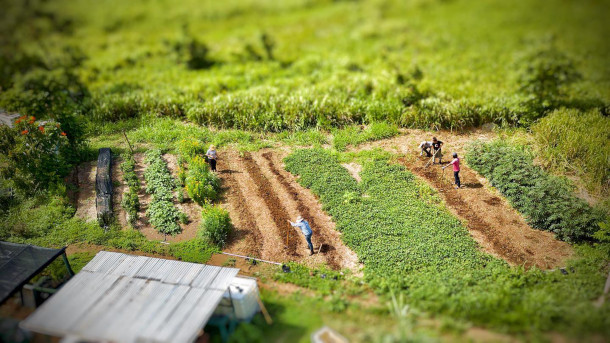
Güakiá Colectivo Agroecológico is a community of female farmers in the Puerto Rican municipality of Higuillar de Dorado. (Photo: Courtesy of Guakia Collectivo Agroecológico)
Some young Puerto Ricans are working to farm more sustainably using agroecology techniques that apply ecological concepts to mimic the way nature works to grow food. Stephanie Monseratte Torres co-founded Guakia Colectivo Agroecológico in 2016 and joins Host Paloma Beltran to discuss a transformation in Puerto Ricans’ relationship with food and the land.
Transcript
BELTRAN: It’s Living on Earth, I’m Paloma Beltran
CURWOOD: And I’m Steve Curwood.
At the top of this special program marking Hispanic Heritage Month we talked about greening Puerto Rico’s electrical grid for more resiliency. Now we turn to look at the movement to bring more harmony with nature in farming on the island. Its tropical location makes Puerto Rico well suited for nearly year-round growing, Paloma.
BELTRAN: Right, Steve. Agribusiness has exploited that advantage for decades, but average Puerto Ricans have little to show for it. Nearly half of adults have incomes below the poverty line and most children are classified as poor. Yet as much as 85 percent of food is imported to the island, making it expensive. And roughly a third of the island residents receive nutrition assistance through PAN, a Puerto Rican version of the program once called food stamps.
CURWOOD: And disasters like Hurricane Maria in 2017 destroyed most of local crops and left communities isolated without supplies for weeks and months.
BELTRAN: Exactly, but a growing number of young Puerto Ricans are working to take advantage of a year-round ability to grow food and re-claim the land, as well as their ancestral, Taino, ways of farming for self-sufficiency. One of them is the technique of agroecology which applies ecological concepts to farming and mimics the way nature works.
CURWOOD: Well, that sounds much more sustainable than importing a lot of inputs like expensive fertilizers and pesticides.
BELTRAN: Right, that’s the idea. And to learn more I reached out to Stephanie Monserrate Torres, she and a partner started Guakia Colectivo Agroecológico in 2016. It’s a farm located in the Dorado region, near San Juan. Stephanie joins me now, welcome to Living on Earth!
MONSERRATE TORRES: Hi, thank you.
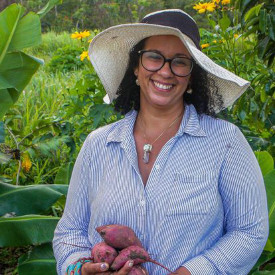
Marissa Reyes Dias is the co-founder of Güakiá Colectivo Agroecológico. (Photo: Courtesy of Guakia Collectivo Agroecológico)
BELTRAN: Well, what are the basic principles of agroecology? How is it different from conventional farming?
MONSERRATE TORRES: So in agroecology we work in harmony with nature, and for us, when we arrived to the land, the land basically dictates to us what it needs. We don't say we want to farm, we want to grow some carrots and that's what we grow, we see what is the land telling us to grow, how to grow it, we've seen our type of land, it really likes trees, and it's because it doesn't have any type of tree. So we've started to integrate some agroforestry practices as well within our agroecology. So we could have more of like a food forest, that it can be self-sustainable and we're only like the land keepers. We’re there to intervene the least we can. And in another way, it also tends not only for the land, it also tends for all living things, not only us as the land owners or caretakers, but also in recognizing we're not machines and we need to take breaks and we need to acknowledge ourselves as human beings, our community, and every living thing in in the farm in our land.
BELTRAN: Why do you think agroecology and agroforestry in particular is a good idea for Puerto Rico?
MONSERRATE TORRES: Well, we've seen how the hurricanes, how climate change have been affecting us. I think it's the most sustainable and the most nurturing way to treat the land. But at the same time, the practices we are having not only make the land better, but help us in times of like a hurricane comes, I don't have only one type of harvest that I'm going to lose, I have an abundance of diversity that I can depend on. So let's think I have in my farm a lot of trees, right, but in the lower layer, I maybe have sweet potatoes and some herbs growing, and some sweet peppers and some tomatoes. And that's all being protected by the trees, and then other stuff are being protected by the soil, by the land. So I have all this diversity that I don't lose everything in one climate change, one disaster. So it's better for me to build myself back up again. And to provide for my community and my families and for myself.
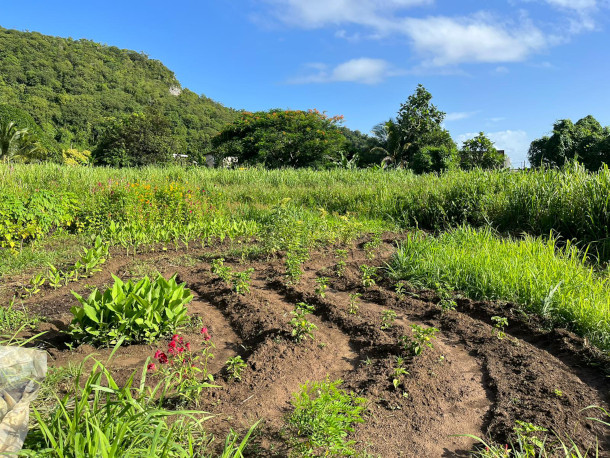
Turmeric, sweet garlic, amaranth and edible flowers in the Güakiá Colectivo Agroecológico. (Photo: Courtesy of Guakia Collectivo Agroecológico)
BELTRAN: Yeah, that, that sounds like perfect harmony.
MONSERRATE TORRES: Exactly. It's a lot of small details to think about, but it makes sense, a forest is already self-sustainable. So that's what we're trying to imitate but with food.
BELTRAN: I understand that you started the project a few months before Hurricane Maria hit.
MONSERRATE TORRES: Correct.
BELTRAN: How did that impact your goals and your community?
MONSERRATE TORRES: Well, it changed everything, it changed our plans, because we thought we were going to start farming and then the community would come for us, but it was backwards. We had to go to the community first and then farming, because the emergency was too much for us to think of something else other than helping the community, and everyone was like that, not, not only us. As Puerto Ricans, we look out for each other. So we met two elderly woman like talking in an abandoned house, and we started to talk to them and see what we could do. And we came up with the idea to make like the soup stone. So everybody brought something and we will make a big soup, and everybody would eat and with the next thing everybody brought we will make the next one. And that's how we started to get to know each other and make this relationship we had. And we started to do a composting program because people were really excited about what we were doing and how can they contribute. And we thought, well, let's do a composting program. So every Friday we will go and look for the compost and their organic things from the kitchen. And it became like a competitive thing for them to see who had the most compost because we also made exchange with them sometimes like oh, we'll give them some pumpkins or we will give them compost so they could use in their gardens. So we started to have weekly meetings every Saturday with the community. They made a census. They wanted to do movie nights and we said okay, so we need our projector we need this. So everybody took stuff from their house that they didn't need. And we did a pulgero, so we sold stuff in the park to get the money, like a garage sale, basically but a community sale because everybody brought everything. And we just gave fliers all around the morale of the municipality and people came. And that's why they have a projector for the community and started to do movie nights. So it's been like that little thing that did this big impact just walk in and to see and to meet everyone and create a relationship.
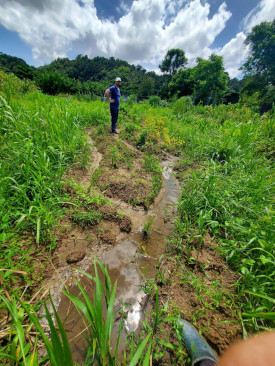
The Guakia finca after hurricane Fiona. The farm experienced some harvest loss like sweet potatoes and peppers but trees around the farm protected most of the harvest. (Photo: Courtesy of Guakia Collectivo Agroecológico)
BELTRAN: As I understand it, you see your work in farming as an act of rebellion or an act of protest? Why is that?
MONSERRATE TORRES: Well, I think in a place in an archipelago, that people are trying to take our land and trying to make us move away from our land, and especially in the municipality that we are in Dorado, which is curated for tourists, its hotels, its Airbnbs, and then you see the duality of low income communities, but in these mansions people getting in their homes in helicopters. But then in the next street, there's people living in their cars, because the hurricane Maria, people haven't had their house yet. Or they still don't have water or not only those essentials but food, restaurants and places that are like basic for people in some cities, or what you need nearby is not accessible for them, because they're already all curated for the tourists. So I think what we do in this place that we're doing it says a lot. And we've been asked to leave when we started our municipality, our alcalde, that's how we call it, they asked us to leave for like this agroecology touristic park they had. But when we talked to the community, our neighbor community and we proposed to them, this is what they're saying, what do you guys think? And they said "no, your work is here with us in this community" and so we stayed.
BELTRAN: It seems like you're welcomed in the community.
MONSERRATE TORRES: Yes and that's what we want.
BELTRAN: You know, Stephanie, historically, the main products that were encouraged by the US after colonization, were things like tobacco and sugar. And these products aren't really meant to nurture people substantially. But you focus on a wide range of produce, like a lot of fruits and different vegetables. Can you tell us about that, please?
MONSERRATE TORRES: Yes, we've been trying to grow a lot of things, but not only to grow, but also how to make these things. But one of the things we've seen is that sometimes we grow cassava. But my generation doesn't know how to use it, or doesn't know how to peel it.
BELTRAN: It sounds like a lot of the practices of cooking food, have been lost?
MONSERRATE TORRES: Have been lost, yes. Have been lost a lot. Everything's already pre-made everywhere. The generation of my parents, it was also fast foods. And everything pre made, like my mom I remember would buy hamburgers that I would just put it in a microwave and that's how I would eat it. So everything was already pre-made. And nothing was like I had to let alone grow it [LAUGH] but how I would have to buy it like already peeled because you can go to the supermarkets and you can see you can buy every root vegetable already peeled. And I remember that my grandfather was a farmer and he was like, taken out of the lands to like work in the industry here in San Juan, in the city to make the business and the factories and started to work. And when I told my dad that I wanted to be a farmer he was like, no, I was taken out of that for the better life and you're coming back to it. And I think that's what's really happening right now. It's this whole movement of young people trying to take back the land and rescue all that knowledge we lost, because there's a big gap in age from our grandmothers and grandfathers and our parents that lost all that and we're starting to lose that people and that knowledge and that education of how we were used to do things. And also something that we've been learning or relearning as a culture is that if you make things from scratch, there's a lot of things you get from what you're not using. So you can compost your peels right? Or you can make a tea to use for your garden to add nutrition to your plants. There's so many things we could do or sometimes it's even like a medicine it could be like a tea or it could be brewed for a headache or for a tea. When I talked to my grandmother and she tells me- no don't, don't throw that away because that could work for this, or put that on the fridge. And when you, like my, my grandmother, no top of any vegetable was going to go away because that was going to be the vegetable broth.
BELTRAN: Yeah! [LAUGH]
MONSERRATE TORRES: So, you know, like everything when you do it from scratch and we start to look at everything as a resource or as something with value, there's no way you're throwing that away. And I think I really got that with agroecology because we really value everything in every step, because it takes so long and so much effort. And that's only in the type of agriculture I do. I'm not even touching base with how our government makes it so much harder for us to make things happen. So I think everything is like a value, or maybe not for me, but for somebody else who needs it.
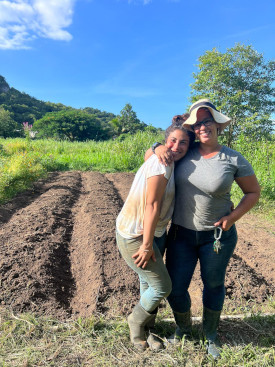
Stephanie Monseratte Torres and Marissa Reyes Dias, the co-founders of Güakiá Colectivo Agroecológico. (Photo: Courtesy of Guakia Collectivo Agroecológico)
BELTRAN: What were some of the challenges in starting Güakiá?
MONSERRATE TORRES: Well, we're still in a challenge, there are some permits that would help us access funds, or have discounts in products for us being a company organization. But because of the bureaucracy and because of the negligencia (negligence) of the government, we haven't been able to have those permits that help us be better. There's big farms, that because of the contracts and the type of contracts they have, they get discounts for water when I'm not even able to have access to water in my small farm. So it's those types of things that makes it so hard for me to be a farmer because I have to be so much time out of the farm, going from office to office, and looking for people to help me have those permits. And it's impossible. So that's like one of the little things we have here that it makes us, it makes it crazy.
BELTRAN: I think it takes a lot of courage to start a project like Güakiá, it takes a lot of organization, financial planning, and honestly grit, you know, like, cojones..
MONSERRATE TORRES: Si [LAUGHS] me encanta.
BELTRAN: What makes you proud of your work and what inspires you to keep on going?
Marissa Reyes Dias pictured above with a bee box. Güakiá Colectivo Agroecológico have been raising bees since July 2022 which they say has helped pollinate flowers and crops around the farm. (Photo: Courtesy of Guakia Collectivo Agroecológico)
MONSERRATE TORRES: So I think first talking about the communities I've seen. Like we've been basically since 2017, that Maria hit in this land and we've seen how doing agroecology, doing the thing we believe in has changed our community for the better. How we're growing, like you said together, right, not only as individuals but as a collective. Not me and Marissa a collective, but the whole community as a collective. We've seen how we have this, we call him he's like the uncle, but he's a neighbor that has like, maybe like 70 acres of farm and he grows in a monoculture way. We don't avoid monoculture farmers, we talk and I think that's when they see what we're doing, they're like curious, and that's what happened with him. He saw and he thought we were the crazy kids doing stuff. And then we would find him coming to the farm with people so they could see the type of stuff we're doing, because they couldn't believe that pumpkin and beans and corn will do like that well, and that's an ancestral way of growing these things. It's called las tres hermanas, the three sisters. So when he saw that, he was like what! And he came weeks ago to take a workshop in our farm! The uncle that's supposed to be teaching us, he came to our farm to take agroecology practices to his monoculture farm. So you see that change. It's those little things that make like big movements and those are the ones we see. But I know that people talk, like the neighbors talk- "y las muchachitas esas locas and what they're doing there and como estan ah en el sol, a pues ellas son unas bravas." And how they start to think about us and women and that's something else we've seen also. Like, when we have our volunteers that this year have been mostly women we've seen how they're like, oh my god, it's you and Marissa only like just you guys and this is your farm. You're not working for any men, because typically a man is the owner or like the head of the farm, and then he has his little woman workers. So no, it's us, it's our farm and we do the heavy things, so you have to do it as well. And you're not going to leave this farm until you get the trimmer and you do the things that any men would do, because we can do it. And we've seen how they started to like maybe like, oh, I could work on a farm and maybe volunteer and maybe do something else, but now I can have my own farm and I could provide for my family. Or I could do something else that's related. I don't have to work for anybody else. So I think those are like the subtle things that we've seen that, that are making change.
Crear sistemas de cosecha de agua de lluvia son esenciales para disminuir los impactos de las sequías en las siembra... algo que tenemos que volver a normalizar. Aquí el sistema de Guakiá, Colectivo Agroecológico. Poco a poco aumentando capacidad. pic.twitter.com/4q84HJKanQ
— Marissa Reyes-Díaz (@MarReyes74) August 23, 2020
BELTRAN: Stephanie Monserrate, thank you so much for joining me.
MONSERRATE: Thank you for having me.
Links
Learn more about Güakiá Colectivo Agroecológico
Güakiá Colectivo Agroecológico
The Washington Post | “Puerto Rico’s Energy Problems Go Beyond Maria Fiona”
Conciencia agroecológica en nuestros jóvenes - Marissa Reyes Diaz
Connect with Marissa Reyes Founder of Güakiá Colectivo Agroecológico on Twitter
Living on Earth wants to hear from you!
Living on Earth
62 Calef Highway, Suite 212
Lee, NH 03861
Telephone: 617-287-4121
E-mail: comments@loe.org
Newsletter [Click here]
Donate to Living on Earth!
Living on Earth is an independent media program and relies entirely on contributions from listeners and institutions supporting public service. Please donate now to preserve an independent environmental voice.
NewsletterLiving on Earth offers a weekly delivery of the show's rundown to your mailbox. Sign up for our newsletter today!
 Sailors For The Sea: Be the change you want to sea.
Sailors For The Sea: Be the change you want to sea.
 The Grantham Foundation for the Protection of the Environment: Committed to protecting and improving the health of the global environment.
The Grantham Foundation for the Protection of the Environment: Committed to protecting and improving the health of the global environment.
 Contribute to Living on Earth and receive, as our gift to you, an archival print of one of Mark Seth Lender's extraordinary wildlife photographs. Follow the link to see Mark's current collection of photographs.
Contribute to Living on Earth and receive, as our gift to you, an archival print of one of Mark Seth Lender's extraordinary wildlife photographs. Follow the link to see Mark's current collection of photographs.
 Buy a signed copy of Mark Seth Lender's book Smeagull the Seagull & support Living on Earth
Buy a signed copy of Mark Seth Lender's book Smeagull the Seagull & support Living on Earth

